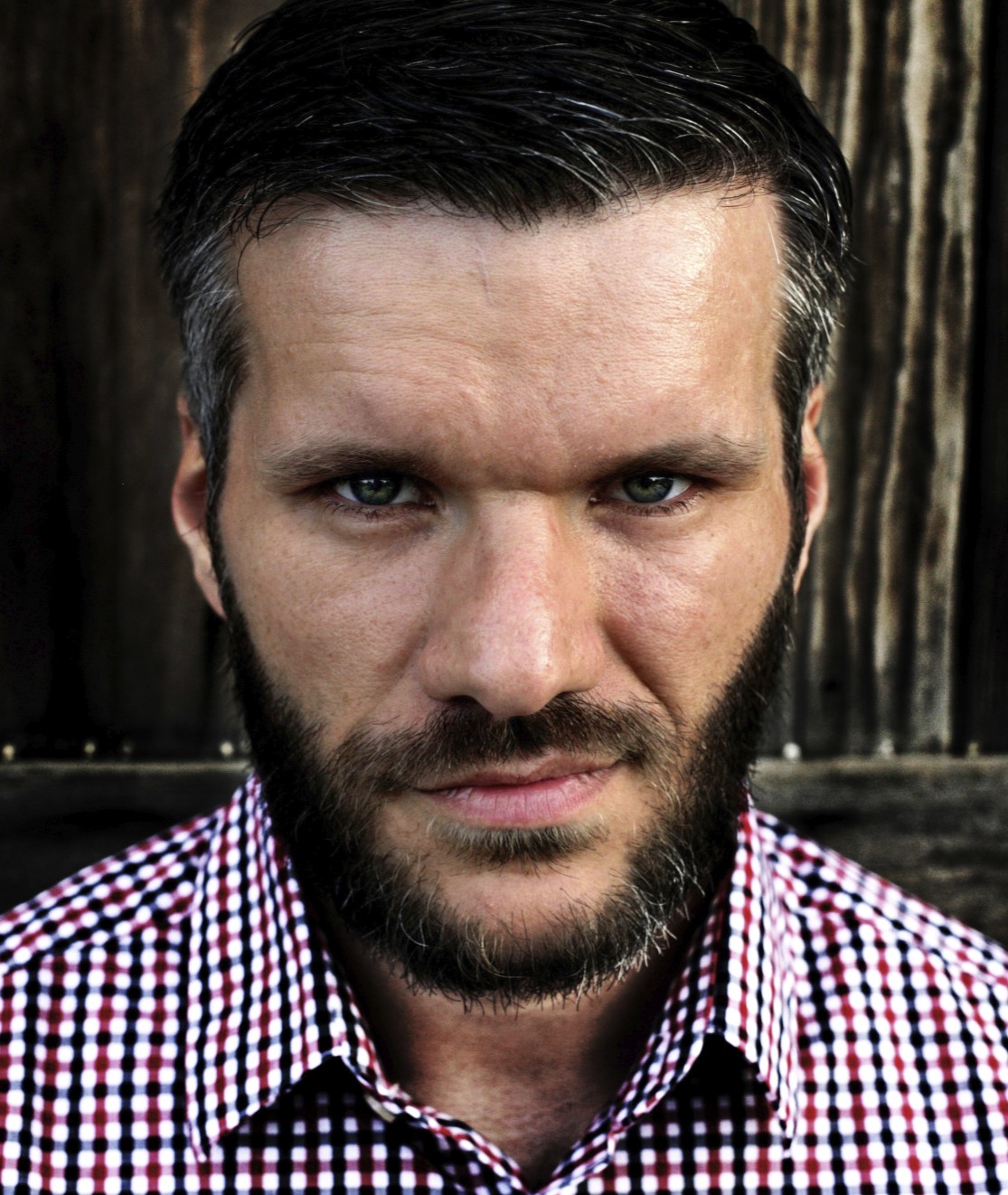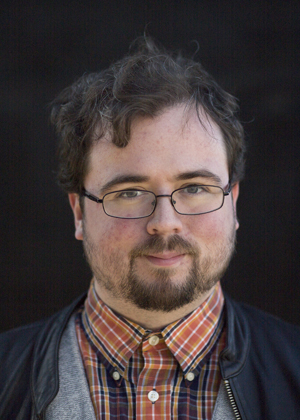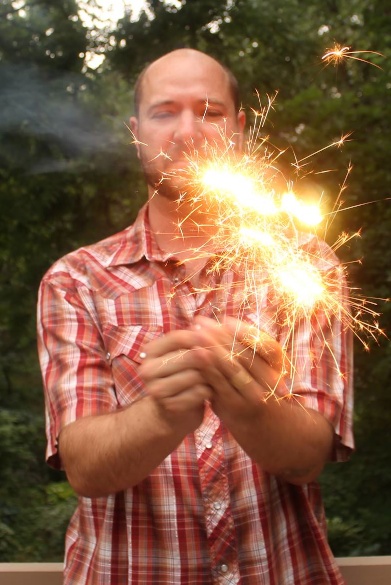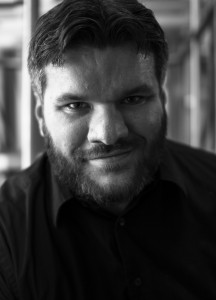 My first encounter with Matt Bell was in 2004, via publishing his story “Rest Stop” in Hobart #5: The Travel Issue. It’s about a not-entirely-un-Matt-Bell-like narrator, and it takes place in a rest stop in Arizona, where the character has road-tripped from Michigan headed toward California and has now, finally, but of course not quite, arrived at his final destination. This was our first theme issue, inspired in part because I’d just arrived in Ann Arbor, having taken a few weeks to road-trip my move from Seattle, by way of California, Arizona, etc. There was not only a lot I liked about the story, but also a lot I recognized.
My first encounter with Matt Bell was in 2004, via publishing his story “Rest Stop” in Hobart #5: The Travel Issue. It’s about a not-entirely-un-Matt-Bell-like narrator, and it takes place in a rest stop in Arizona, where the character has road-tripped from Michigan headed toward California and has now, finally, but of course not quite, arrived at his final destination. This was our first theme issue, inspired in part because I’d just arrived in Ann Arbor, having taken a few weeks to road-trip my move from Seattle, by way of California, Arizona, etc. There was not only a lot I liked about the story, but also a lot I recognized.
Maybe a year after publishing that story and issue, Matt moved the hour and a half south from Saginaw to Ann Arbor, and once in the same town our discussions likewise moved from online to irl [in real life]. Our friendship grew over the years, and over beers, and we frequently found ourselves getting together to talk writing and reading, to rave about new books, to read and comment on each other’s writing, to gossip about what journals and presses we liked (and, ok, sometimes, those we… liked less), and to eventually convince one another to go back to school for our MFAs.
It’s been exciting to watch Matt’s growth as a writer over the last decade. Seeing new readers find him, seeing him filter those writers we talked and raved about over the years into the creation of his own voice, and now seeing the avalanche of support and good press for his debut novel, In the House upon the Dirt between the Lake and the Woods (Soho, June 2013), has been terrific.
In the House feels both like a natural progression from his story collection, How They Were Found (Keyhole Press, 2010), and something entirely new. As many reviewers have noted, it is dreamlike and fairy-tale-like and fable-like. But like dreams and fairy tales and fables, there is something recognizable and real at its heart. Recognizable from our own daily lives, and recognizable from many of the conversations I’ve had with Matt over the years. And though he left Ann Arbor last summer to take a teaching job at Northern Michigan University, the conversation has continued—albeit less often irl.
Interview:
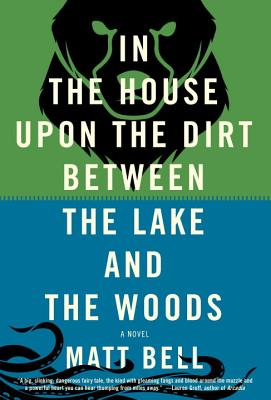 Aaron Burch: While it sometimes seems easiest to talk about this book in terms of sentient bears, and giant squid, and things being sung into existence, a lot of what grabbed me the most in this newest book of yours was the central relationship between the husband and the wife. In part because it grounded the story, obviously, but also because while you were working on this book you officiated several weddings (like, um, mine). There’s a lot of marriage ceremony language in this novel, and since you pay such close attention to language when writing, I’m wondering if you can talk about this. Did you find yourself actually borrowing wedding language, consciously or not? And did you at all find yourself noticing one bleeding into the other while in the thick of it, as it were?
Aaron Burch: While it sometimes seems easiest to talk about this book in terms of sentient bears, and giant squid, and things being sung into existence, a lot of what grabbed me the most in this newest book of yours was the central relationship between the husband and the wife. In part because it grounded the story, obviously, but also because while you were working on this book you officiated several weddings (like, um, mine). There’s a lot of marriage ceremony language in this novel, and since you pay such close attention to language when writing, I’m wondering if you can talk about this. Did you find yourself actually borrowing wedding language, consciously or not? And did you at all find yourself noticing one bleeding into the other while in the thick of it, as it were?
Matt Bell: I’m happy to hear you say this, because the central relationship is the point to me too. There wouldn’t be much reason to talk about giant squid and giant bears without it, right?
I never really thought about this in this way, but I like the idea that the three weddings I officiated over the three years I was writing this book about marriage somehow filtered in. I certainly thought about my own wedding, my own marriage. I was teaching a class on world-building a few weeks ago, and my students and I were discussing a great Matthea Harvey essay where she talks about how it’s impossible to build a world with anything but what’s already in ours—and I’m not surprised to find that to build a mythical, non-realist, fabulist marriage I needed what language and rituals already existed, what hopes and fears exist in my marriage, the marriages of our friends, the marriages we know from art. You can twist the world, you can try to subvert it or upend it, but it’s hard to really replace it or erase it—even the hole would be a reminder.
In the novel, the husband and the wife both make up some of the rules of their world, after they arrive on the dirt to build their house: they’ve come to this other place where things are more malleable than they are in our world, and as they discover this they both take advantage in different ways. Similarly, there’s a part of marriage that is about ritual, and part of it that is (or can be) about expected roles, and the same goes for parenthood. But of course, if there’s no one enforcing these traditions—or if the surrounding situation changes—then maybe rituals and roles can be obsoleted, thrown out, replaced.
I want to say I’m not that interested in connecting your fiction with your life, but so much of this book—together and separately from the husband/wife relationship—is also about parenthood. And, not being a parent yourself (though most of us have parents, obviously, and can draw on that experience, and also those relationships around us), I guess I’m just curious how you found the process of writing about it.
I think you’re right that I’m less than interested in writing directly about my own experiences. As a writer, I don’t really get the appeal, although as a reader I’ve certainly enjoyed books and stories based on other writers’ real lives. Partly, it’s always seemed like looking for conflict and tension in your own life is a good way to screw it up—if the only place you get story from is your own problems, then you’re always going to need more problems, and if they won’t come to you, then you’ll have to generate them. (I’m almost positive this isn’t the way this really works for most people, but still it somehow feels like I would generate problems for material, if I had to.) And I think I’m also just aware that I don’t have a particularly dramatic life: the more in control of my day-to-day life I’ve gained, the more I’ve moved it toward a sort of productive routine, where I have a pretty good idea what I’m going to be doing at any particular time, even if the content of those particular activities remains varied and surprising. If I was a more micro-scale writer, I could probably do more with that kind of life, but I’m really not. For whatever reason, my stories generally require a bit larger-scale action, more extreme settings and characters and plots.
But this not being a parent is a central question, right? It’s almost impossible to talk about this book without it coming up, and fair enough: I’ve written two books in a row that are, to varying degrees, about parenthood, and specifically about being a father, but I’m not a father myself. In some ways, it’s as simple as inverting “write what you know”; instead of writing what I know, I’m writing what I want to know, writing what I’m thinking about, what I’m feeling through, what I don’t have a pat answer for.
I think it’s obvious to the point of cliché that there’s almost no way to prepare for much of the work of being a parent: you can read the books, you can watch the movies, you can take all the advice of friends and family, and yet the actual day-to-day life of a parent is unpredictable, its success difficult to measure, and so on. What was less obvious to me is how choosing not to have children—or not being able to, when you desperately want to—is also something that has to be reckoned with, emotionally and intellectually, on an ongoing basis.
At least for us, not having children wasn’t a simple decision, made once, and never again considered. Not having children is something we’re doing, like having children would have been. Or at least that’s how it feels to me. It’s a decision frequently renewed, against cultural norms of marriage and against the expectations of family, especially, and against occasional urges to the contrary. In the same way that parents probably sometimes think (even for a split second) that life would be better without kids, there are occasional flashes where we think it might be better with them. We’ve been married for almost nine years, together almost eleven, and for a lot of people married this long, the only reason not to have kids already is that something has gone wrong. That’s a thing we contend with, whenever we’re with our family, especially the extended family. There’s a sense in which choosing not to have children somehow leaves you childish to others, as if we aren’t committing to the real part of marriage. I think that’s made it into the novel: the husband in the book wants more than anything to be a husband and a father, and when initially he can’t have children, he feels like it diminishes him somehow. He’s an egomaniac, so he sees his role in terms of dominion and control, and now here is this thing he can’t control, that he has no power against—and part of what goes wrong for him and his family is his trying to force the world and his wife’s body and his eventual children to give him what he desires, on his own terms.
So instead of trying to depict my own character accurately upon the page, I write about characters doing things I wouldn’t do, making choices I wouldn’t make. And while I rarely know what motivates them during a first draft, I often eventually end up with characters whose beliefs oppose mine or are at least skewed slightly away, whose reactions to trouble are wrong in different ways than mine are wrong, whose best solutions won’t be my solutions. Then there’s something to explore, and surprises along the way. But what I’m exploring is still, in some ways, my own emotional struggles, just from a different angle. In my own life, I’m concerned with what a marriage without children looks like, with how it grows and develops without kids, because for so many others among my friends and family (and in the depictions of marriage we see), the middle stage of their marriage is about parenthood. But this manifests in my fiction in less straightforward ways, with characters like the narrator of In the House, who wants to be the father to so many children, and who cannot consider a life where that might not be a possibility. He and I are chewing on the same question, maybe, but coming to dramatically different conclusions about our roles, about what we might do next. To understand this character—to write him in an emotionally real way—seems to require a certain growth in empathy, and so perhaps it’s a very readerly way to write.
I want to come back to something you said:
If I was a more micro-scale writer, I could probably do more with that kind of life, but I’m really not. For whatever reason, my stories generally require a bit larger-scale action, more extreme settings and characters and plots.
This isn’t exactly what you mean by “micro-scale” vs. “larger-scale,” I don’t think, but I’m wondering about your transition from writing short stories, to long short stories, to novels. Do you think there has been some sort of growth here, in that your shorter work was (is?) a little more inspired directly from your own experiences?
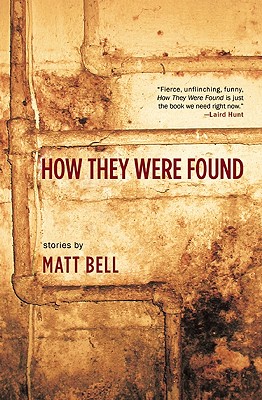 Scale is maybe the wrong way for me to have put it: I think what I mean is maybe quiet vs. loud, or domestic vs. mythic (although that’s an interesting set of poles, and maybe unfair, and that also gets me thinking about fairy tales, which are, of course, often very domestic, but not in the way we normally mean the term). What I think I’m trying to get at is that in even some of my short works, the scope of the action and the “bigness” of the characters just precludes direct personal experience. For instance, there’s a story in How They Were Found where a nineteenth-century preacher is led by the ghosts of the founding fathers to convince an entire town to finance his building a mechanical messiah, and that just doesn’t leave a lot of room for me, or at least the me I think about as my day-to-day persona. What it does leave room for—and perhaps requires—is an exaggerated sense of self that I think I call on a lot in my writing. The self as egomaniac, maybe, where I take my obsessions and I try to multiply them exponentially. You can do the same with your worries or your memories or with whatever else might fuel the story-engine, but it fairly quickly stops being you, or (to bring it back to myself), at least when I do it, it fairly quickly stops being me.
Scale is maybe the wrong way for me to have put it: I think what I mean is maybe quiet vs. loud, or domestic vs. mythic (although that’s an interesting set of poles, and maybe unfair, and that also gets me thinking about fairy tales, which are, of course, often very domestic, but not in the way we normally mean the term). What I think I’m trying to get at is that in even some of my short works, the scope of the action and the “bigness” of the characters just precludes direct personal experience. For instance, there’s a story in How They Were Found where a nineteenth-century preacher is led by the ghosts of the founding fathers to convince an entire town to finance his building a mechanical messiah, and that just doesn’t leave a lot of room for me, or at least the me I think about as my day-to-day persona. What it does leave room for—and perhaps requires—is an exaggerated sense of self that I think I call on a lot in my writing. The self as egomaniac, maybe, where I take my obsessions and I try to multiply them exponentially. You can do the same with your worries or your memories or with whatever else might fuel the story-engine, but it fairly quickly stops being you, or (to bring it back to myself), at least when I do it, it fairly quickly stops being me.
I think you’re right about the length maybe having an effect—some of the most directly autobiographical stories I’ve written have been very short. But I think that’s more because, if the protagonist is too much like me, then I have a tendency to want to be either the hero or the victim in every story, in the way I think most people are in the stories they tell. Occasionally, maybe, we’re willing to be the fool, for a laugh. But I also think that part of the problem is that what often drives my interest in telling a story is some kind of moral or intellectual ambiguity, and I have a lot harder time building that in a story that is primarily about myself, doing something I did. It just doesn’t open up in the same way.
While taking a break from writing this, I just happened to see a quote from Nikki Giovanni, which seemed directly applicable to this conversation:
Writers don’t write from experience, though many are resistant to admit that they don’t. I want to be clear about this. If you wrote from experience, you’d get maybe one book, maybe three poems. Writers write from empathy.
I like that a lot: “writing from empathy.” It’s an idea that’s a lot more inclusive, and maybe gets at what I want as both a writer and a reader more directly.
Now that In the House is done, what do you do if you have a great new idea for, I don’t know, a sentient bear, or a squid, or whatever? Do you just write the story and let it be a new thing and not worry about repeating yourself? Do you fret over not having had the idea a year ago? Do you just let it go?
That’s probably not even a real question so much as it is one borne out of being at the end of a project myself. At some point, maybe when half the stories or so in Backswing (Queen’s Ferry Press, 2014) were written, I started thinking, “these feel like a collection.” And a cohesive collection collection, not just a random collection of stuff I’d written. Do you ever think or worry about writing one more of these kinds of stories and being bummed that it wasn’t in a particular book?
I’m so glad you mentioned the issue of writing “one more” of the kind of story that went into a certain book. I’ve only written half-a-dozen stories or so since finishing How They Were Found, and some of them probably could have gone into that book—but then that book would have become a slightly different thing. And, you know, I actually think there might be a better book that would exclude some of what was in How They Were Found, make room for some of these new stories, and become something else entirely. That might be a better book. But then there are stories that probably don’t go together at all, and maybe those are the stories I should be investigating for possible next steps.
Overall, I think I’m a little more comfortable with the idea that there is going to be crossover between books than I was right after the first book. Looking back at How They Were Found, I remember that, while writing those stories, I often found that a certain idea or technique or whatever would crossover into the next story a little bit, like everything was being used for a story and a half—and that crossover is part of what made the book a book, in that way we both desire, instead of a grab bag of stories. So maybe the crossover between books works in a similar way, and that part of that is what makes the shelf’s worth of books we both want to write into a career.
But crossover doesn’t have to mean repeating myself, and I think it’s worth trying to step away, to at least attempt to write in a new direction. I think your process of working on a lot of different things at once seems like a good way to open up the possibilities again, and to try on lots of different voices and stances. I tend to stick to one thing at a time, only writing something else between major drafts, so maybe that process takes me longer.
In any case, I thought I’d write some stories after In the House upon the Dirt between the Lake and the Woods, but instead I wrote two false starts to novels, abandoning both after about one hundred pages or so—that tends to be the length bad novels go to die for me. And then I started a third one, which, thankfully, has made it past that mark, and is going really well. It’s different than the last novel, in many ways, and that’s made it exciting to write. While I worked on In the House, anything that couldn’t fit within that voice or the scope of that story went unexplored for several years, which sometimes became frustrating. The new book makes room for those interests and ideas, and maybe that’s part of why it worked, instead of the other two I started, which might not have.
The best part about moving forward into the new book is that it’s a chance to grow again. To make a probably poor analogy: I don’t know what your experience was, but I can remember being younger and dating and feeling like there was always this burst of personal growth that followed the end of every long-term romantic relationship. Suddenly you have all this free time, so you start reading new books, and you get to watch a kind of movie the ex-girlfriend didn’t like, you go to different kinds of restaurants. Maybe you drink more or exercise more or whatever. If you spent enough time with your ex, it means you weren’t spending time with other people, so you were missing out on other kinds of conversations and so on, and for a while it’s so exciting to be out with all these other people, and all of this comes together to create a time of at least potential change. I could keep this up, but you get the idea. I think there’s something similar that happens when you finally move on from a book project. You spend three or four years having one kind of experience—which may, of course, be wonderful most of the time, full of deep feeling, but nonetheless constrains you in certain ways—and then afterward, there’s this chance to move in a new direction, to reinvent yourself a bit in another project. You’re still going to be you, of course, but hopefully a slightly improved you. That’s all I’m hoping for from book to book: a chance to change, a chance to be better.
Editor’s Note: A special congratulations to long-time FWR friend Matt Bell upon the release of this new book. We couldn’t be happier to see the wide—and much deserved—attention this novel has already begun to receive in its first week of publication. Nor can we imagine someone who better exemplifies what it means to be a “literary citizen.” Over the years Bell has mentored or reached out to more young writers than can perhaps be counted—as an editor, as a teacher, and as a fellow practitioner of the craft. Thanks for your tireless energy on behalf of fiction, writing, and the writing life. And congrats on this novel!
Further Links and Resources:
- For more on Matt Bell and his work, please visit his website.
- Follow Matt Bell on twitter: @mdbell79.
- Here is a selection of stories and essays written by Bell.
- Despite Bell’s insane productivity (see link above), he still finds time to edit the esteemed online literary journal The Collagist, which has been published by Dzanc on the 15th of each month since August of 2009, most recently releasing Issue Forty-Seven.
- Coincidentally, Issue Forty-Seven of The Collagist features a story by Aaron Burch, entitled “The Apartment.” Check it out.
- Burch is also the founder and editor of Hobart: Another Literary Journal, and an editor with Elizabeth Ellen of Short Flight/Long Drive Books.

